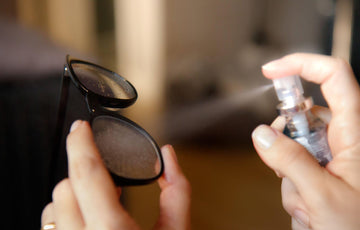In the glittery world of sunglasses care, understanding how to clean sunglasses fruitfully becomes not just a matter of aesthetics but also functionality. This guide delves into the nuances of sunglass maintenance, providing a flawless method to clean sunglasses lenses, thus elevating your daily routine.
With a touch of finesse, let's explore the best way to achieve a smudge-free shine for lenses that shine brightly.
Step-by-Step Sunglasses Cleaning Process
For your sunglasses to remain flawless, follow a thorough and detailed sunglasses cleaning routine. This procedure not only improves the sunglasses' appearance but also preserves their functionality.
Step 1: Wash Your Hands Thoroughly
Before handling your sunglasses, make sure to wash your hands to eliminate the chances of specks of dirt or oils transferring to your sunglasses lens surface.
Step 2: Rinsing the Glasses
Start by gently rinsing your sunglasses under a stream of lukewarm water. This enables you to remove dust and loose particles, preventing scratches while wiping the lenses later.
Step 3: Applying Cleaning Solution
Choose an appropriate cleaning solution.
For everyday cleaning, a few drops of liquid dish soap without harsh chemicals will be enough.
In case, your sunglasses need a deep cleanse, choose a specially formulated sunglasses cleaner spray.
Prepare a fair amount of soapy water; make sure it bubbles slightly when stirred.
Step 4: Drying the Lenses & Frames
After washing the soap off, shake off the excess water and carefully pat the lenses and the frame with a clean, lint-free microfiber towel.
Ensure the towel is not laundered with fabric softener, detergent, or any other cleaning material that can smear lenses.
Step 5: Gentle Drying
For the final drying step, use a microfiber cloth for optical surfaces. These specialized cloths are gentle and effectively absorb moisture without leaving behind lint or streaks.
Step 6: Inspecting Again
Examine your lenses in a good light for any residual streaks or marks. Gently wipe the lenses in a circular motion using the microfiber cloth until the lenses are clear and sparkle.
If smudges persist, particularly oily fingerprints or spots, moisten a corner of the cloth with clean water or lens cleaner and gently rub the affected area.

What Should Be Used to Clean Sunglasses?
Sparkling clean lenses transform your vision and maintain the brand-new look of your sunglasses. For those wondering how to clean sunglasses lenses effectively, options range from specialized sunglass wipes to smooth sunglasses cleaner sprays.
Delving into details, it becomes clear that certain materials and cleaning agents align better with the delicate surfaces of various sunglass coatings.

How Is Microfiber the Best Material for Cleaning Sunglasses?
"What to use to clean sunglasses?" In all cleaning tools, the microfiber cloth is the hero for lens care.
Gentle on surfaces, its intricate fabric structure traps particles, hence, eliminating the risk of scratches. Compared to other materials, microfiber does not just push debris across the lens; it lifts and holds onto the dirt, which is critical in preserving the integrity of your lenses.
Why opt for a microfiber cloth over, say, a paper towel or the corner of your shirt? Fabrics like cotton or paper can contain abrasive fibers that might be invisible to the naked eye but can introduce micro-scratches to the surface of your lenses over time. These tiny abrasions can accumulate, ultimately degrading the clarity of your eyewear.

What Cleaner to Use for Different Sunglasses Coatings?
Solutions designed for cleaning polarized sunglasses take into account the delicate nature of the polarized coating, which can be damaged by aggressive chemicals. Cleaning agents should be free of ammonia, alcohol, and bleach. The question 'Can I clean my glasses with Windex?' often arises, and the answer is a resounding NO, as such products can strip away lens coatings, leaving them vulnerable to further damage.
Instead, the options below are easy and recommended.
- Lens Wipes: Convenient for on-the-go maintenance, pre-moistened, and gentle enough for most coatings.
- Glasses Wipes: Similar to lens wipes, they are suitable for daily use to maintain visual clarity.
- Glasses Cleaner Spray: A specialized solution that targets grime and residue while being safe for anti-reflective and other specialized coatings.
- Eyeglass Cleaner: An Alcohol-free solution catering to frail lens surfaces for easy smudge removal.
- Glasses Cleaner: Comprising of both sprays and wipes, this cleaner keeps lenses in the best condition.
- Camera Lens Cleaning Kits: Designed specifically with tools for high-precision sunglass care.
What Not to Do When Cleaning Sunglasses?
There are many things you should NOT do when cleaning your sunglasses;
- Using sunglasses cleaner with harsh chemicals like ammonia or bleach. The reason is, it damages lens coatings.
- Using Hot Water to clean or soak your sunglasses as this warps frames and distorts lenses.
- Using a hard material cloth to wipe the lenses instead of soft lint-free microfiber cloth.
How to Get Smudges off Sunglasses?
Having dark shades means having smudges on lenses show up now and then. "How to get smudges off glasses?" There are two simple things you can do to address this concern.
Apply a drop of alcohol-based lens cleaner to a microfiber cloth and gently rub your shades in a circular motion until the smudge lifts away. You can also use a pre-moistened lens wipe designed to tackle smudges. Avoid using paper towels for this as it may lead to scratches.
Understanding Different Lens Coatings and Materials
Having sunglasses in several lens coatings and materials requires a unique method of maintenance for each lens. UV Protection Lens for shielding eyes from Harmful Ultraviolet rays, Anti-glare lens for reducing reflective light, or Scratch-resistant coated lens, all these can be quite durable if maintained properly.
Role of Temperature in Cleaning Sunglasses
Temperature plays an important role in maintaining the genuineness of your sunglasses. Avoid using extreme temperatures, such as hot water for removing oils or direct sunlight for drying, as they do more damage and warp frame materials.
Cleaning Approach with Different Coatings & Materials
Different coatings and materials need a specific cleaning approach, to preserve their original form and extend lifespan.
For example, lenses with an anti-glare coating benefit from gentle cleaning to avoid damage to their delicate surface. Polycarbonate lenses require careful handling to prevent scratches even though they are durable.
Users should opt for soft microfiber cloths and avoid coarse materials.
- UV-Protection Coatings: Maintain the shine of the coating by avoiding harsh & strong chemicals and instead opt for water or lens cleaning solution.
- Anti-glare Surfaces: Requires a touch-free cleaning option like a directed stream of air for debris removal.
- Scratch-resistant Layers: While durable and sturdy, these lens layers still acquire marks if not carefully handled; soft velvety cloth with circular motions is best.

How Many Times I Can Clean My Sunglasses?
Regular eyewear cleaning removes debris and smudges, maintaining clarity and extending lifespan. The frequency of cleaning depends on usage and the environment. Sunglasses used daily outdoors require more frequent cleaning than those worn occasionally.
Daily Care: A Quick Wipe After Each Use
Gently wiping the lenses with a microfiber cloth prevents oils and dust buildup. Doing so removes fingerprints and even smudges without needing specialized liquids or sprays.
Deep Cleaning: Frequency for a Thorough Clean
Routine cleaning with wipes is effective for sunglasses but a thorough clean-up is crucial for removing built-up grime. Using a dedicated sunglasses cleaner or even diluted dish soap solution and rinsing with warm water weekly is recommended if exposed to sweat, oils, or saltwater.
Wrapping Up!
Clean sunglasses not only give clear vision but also ensure the longevity and aesthetic appeal of your fashionable accessories. By routinely adopting lens and frame maintenance into your daily life, you can actively prevent scratches and damage, preserving the flawless condition of your sunglasses. Embrace these cleaning and care strategies to maintain their Unspoiled state and secure the investment made in your stylish eyewear.
Looking to tailor your eyewear choices to your style further? Keep an eye out for our upcoming guide on selecting the perfect sunglasses, where you'll find expert advice on matching eyewear to your face shape and lifestyle. Our guide will help you choose sunglasses and enhance your comfort and visual clarity.
Frequently Asked Questions (FAQs)
Q: Can I use soap and water to clean my sunglasses lenses?
Yes, soap and water can effectively clean sunglasses lenses by removing oils and dirt without causing damage.
Q: Are sunglass wipes effective for cleaning?
Yes, sunglass wipes effectively and conveniently remove smudges and dust without harming the lenses.
Q: What should I avoid when cleaning my sunglasses?
Avoid harsh chemicals, abrasive materials, and household cleaners that can damage lens coatings or scratch the lenses.
Q: How do I clean polarized sunglasses lenses?
Rinse the lenses with lukewarm water, apply a specialized cleaner, and dry them with a microfiber cloth to maintain clarity and avoid damage.
Q: Can I clean my glasses with Windex?
No, Windex should not be used as it contains chemicals that strip away lens coatings and damage the lenses.
Q: Can I use homemade cleaning solutions for my sunglasses?
A mixture of distilled water and small dish soap is a safe and effective homemade solution for cleaning sunglasses.
Q: Is it necessary to disinfect my sunglasses?
Disinfecting sunglasses is generally unnecessary for everyday use; regular cleaning is typically sufficient to maintain hygiene.




